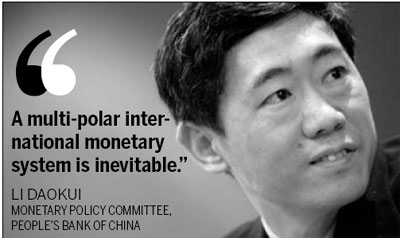Business
Multi-polar global monetary system beckons
By Li Xiang (China Daily)
Updated: 2010-09-07 08:02
 |
Large Medium Small |

China seeking bigger say in world economy through ties with Africa
HEFEI - China may not demand a greater quota in the International Monetary Fund (IMF) during the upcoming G20 summit in Seoul but would seek a bigger say in the global economy by strengthening its relationship with African countries, a central bank advisor said.
"It is more important for China to play an active role in building and strengthening its ties with foreign countries, especially African nations, than simply having a higher quota in the IMF," Li Daokui, an economist at Tsinghua University and a member of the monetary policy committee of the People's Bank of China, told China Daily at an economic forum on the weekend.
The IMF's quota reform is expected be a key topic at the G20 summit in Seoul in November as China and other emerging economies have called for a greater quota in the IMF to reflect their increasing roles in the world economy.
But Li warned of the potential "zero-sum result" of the reform, saying that it may hurt the interests of China's friends as one country's greater share would mean smaller shares for others.
Each member country of the IMF is assigned a quota, based broadly on its relative size in the global economy. The size of the quota determines a country's voting power and its financial commitment to the IMF.
China currently holds a quota share of 3.65 percent in the IMF, the largest among developing economies, while the United States and Japan hold 17.09 and 6.13 percent respectively.
Li pointed out that a gradual but fundamental change in the international monetary system would emerge in the aftermath of the global financial crisis, which will give China the opportunity to strengthen the influence of its own currency in the global financial market.
"A multi-polar international monetary system is inevitable," he said. "The stimulus policies adopted by the US and Europe would lead to excess liquidity in the global market, which in the long run would weaken the status of their currencies."
In the meantime, China is accelerating the expansion of the use of the yuan beyond its borders, underlining its determination to reduce its reliance on the dollar and eventually wield more influence in the global financial market.
China recently widened the pilot program permitting trade to be settled in yuan rather than dollars or other currencies in 20 provincial regions.
Trade settlement using the yuan totaled 67.08 billion yuan ($9.84 billion) in the first half of the year and 75 percent of these were settled in Hong Kong, according to the central bank.
The authorities are also planning to let overseas funds and brokerages take yuan deposits and invest them in mainland capital markets, a move designed to lift the international appeal of the Chinese currency and give foreigners more channels to invest their yuan holdings.
People's Bank of China Governor Zhou Xiaochuan proposed last year that the US dollar be replaced as the dominant reserve currency with Special Drawing Rights, the IMF's unit account, the value of which is based on a basket of currencies.
While many commentators said that the yuan still has a long way to go before it can become an international currency, the steps taken by the Chinese authorities are seen as crucial ones for the nation to move toward a liberalized capital account and full convertibility of the yuan.
China Daily